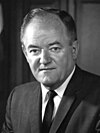Democratic National Convention of 1968
|
1968 presidential election |
|
 
Nominees
Humphrey and Muskie |
|
| Convention | |
|---|---|
| Date(s) | August 26–29, 1968 |
| City | Chicago, Illinois |
| Venue | International Amphitheatre |
| Candidates | |
| Presidential nominee | Hubert Humphrey of Minnesota |
| Vice Presidential nominee | Edmund Muskie of Maine |
| Other candidates |
Eugene McCarthy George McGovern |
The 1968 National Convention of the U.S. Democratic Party was held August 26–29 at the International Amphitheatre in Chicago, Illinois. As President Lyndon B. Johnson had announced he would not seek re-election, the purpose of the convention was to select a new presidential nominee to run as the Democratic Party's candidate for the office. The keynote speaker was Senator Daniel Inouye (D-Hawaii).
Vice President Hubert H. Humphrey and Senator Edmund S. Muskie of Maine were nominated for President and Vice President, respectively.
The convention was held during a year of violence, political turbulence, and civil unrest, particularly riots in more than 100 cities following the assassination of Martin Luther King, Jr. on April 4. The convention also followed the assassination of Democratic presidential hopeful Senator Robert F. Kennedy of New York, on June 5. Both Kennedy and Senator Eugene McCarthy of Minnesota had been running for the Democratic Nomination at the time.
In 1968, despite the control of the House of Representatives, the Senate, and the White House, the Democratic Party was divided. Senator Eugene McCarthy entered the campaign in November 1967, challenging incumbent President Johnson for the Democratic nomination. Robert F. Kennedy entered the race in March 1968. Johnson, facing dissent within his party, and having only barely won the New Hampshire primary, dropped out of the race on March 31. Vice President Hubert Humphrey then entered into the race, but did not compete in any primaries; he inherited the delegates previously pledged to Johnson and then collected delegates in caucus states, especially in caucuses controlled by local Democratic party leaders. After Kennedy's assassination on June 5, the Democratic Party's divisions grew. At the moment of Kennedy's death the delegate count stood at Humphrey 561.5, Kennedy 393.5, McCarthy 258. Kennedy's murder left his delegates uncommitted.
...
Wikipedia
